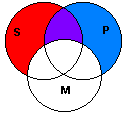Atheism doesn't really make any positive claims... thus the attribute of "reasona
This trick was first introduced by Antony Flew back in the 1970s.
There is no God is a knowledge claim.
There is a God is a knowledge claim.
Both have to be given evidentiary support in order to take them from the category "belief," to the category of "knowledge."
Fallacy of the undistributed middle (Technical Response to the post-modern proposal by New Atheists to equivocate the terms, "Atheism," and "Agnostic").
P1 -All Russians are revolutionaries
P2 - All anarchists are revolutionaries
A - Therefore all anarchists are Russians.
The middle term is 'revolutionaries." While both Russians and anarchists share the common property of being revolutionaries, making both premises true, there may be separate groups of revolutionists, and so we cannot conclude that all anarchists are the same as Russians in every way.
Now let's examine the redefinition of "Atheism," from a claim that there is no god(s) to a lack of belief in god(s).
P1 - All agnostics lack the belief in god(s)
P2 - All atheists lack the belief in god(s)
A - All atheists are agnostics.
Something has happened here that seems wrong but is hard to nail down why. The first two terms are equivocated and I have dealt with that informal fallacy elsewhere.
Let's proceed since the origin to the change in definition seems to orb around Antony Flews 1970s arguments suggesting those lacking belief should not have to defend their position. Further, that it should be the starting point for knowledge.
P1 - All agnostics make no knowledge claims (this premise is also false but work with my assumption)
P2 - burden of proof rests on those making knowledge claims
P3 - All atheists are agnostics
A - Therefore (from 1,2,3) atheists have no burden of proof
The Example is represented by this diagram, where "S" represents the minor term, "Atheists" "P" I is the major term "Agnostics" and "M" the middle term "make no knowledge claims." The diagram does not show the conclusion to be true, which means that the argument is invalid.
Further, we could see the intersection in purple would be the property of "lacking belief in god(s)." But what about the red portion? This is the property of claiming there are good reasons for believing their are no god(s)!
The red area in the Venn diagram above also corresponds with knowledge claims. Or justified beliefs. The agnostic has insufficient evidence to make atheistic knowledge claims. They could gather evidence in the future and become theist or atheist, but currently are not making such claims.


